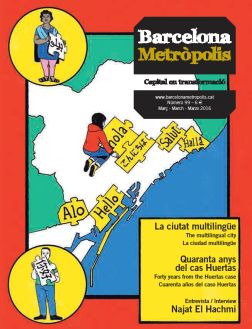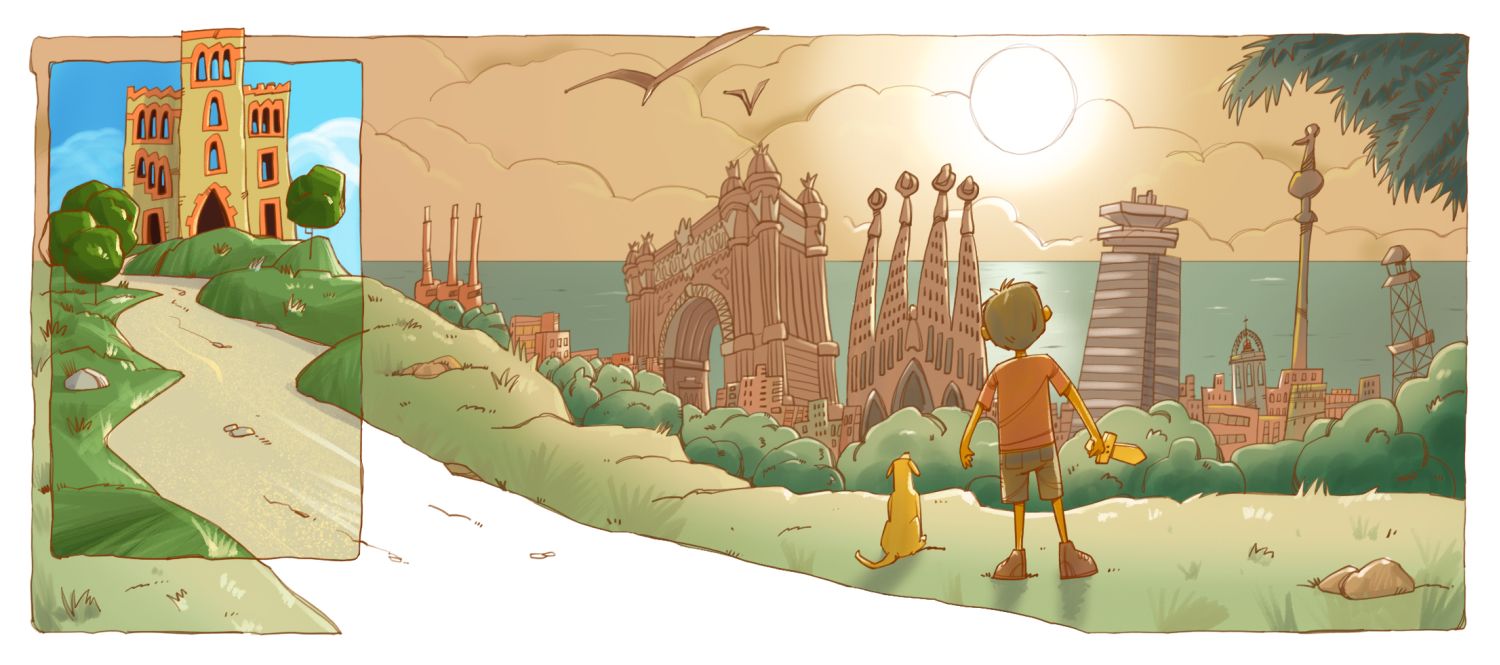This hill was colonised by people who came from all over, tamed the hillsides, opened the path between Barcelona and its backbone.
I have no memories of the smell of lignum vitae, cedar or any other hardwoods. If memories travel in scents and the scents are places, then mine travel in fallen pine needles, the stunted pine trees whose low branches served as the vantage point from which you could make out Barcelona, so near and yet so far. The rumbling of the city grows dim like the bumblebees buzzing in and out of the shrubs around the castle. Afternoons of cold tortilla sandwiches spent watching the shiny film of the sea in the distance, being surrounded by the whispering of the pine trees, the density of time passing slowly and almost limitless freedom. The touch of hands between the cracks of that unfinished tower that someone dreamed up, the war games that toughened the kids up, the assaults on the battlements and later, charging uphill to the eagle’s peak. And the caves where there were no old mattresses or obscene paintings, because imagination drew cave paintings, legends of the dead hand.
All that, and the torrents rushing down towards Ciutat Meridiana when it was raining and not even Noah could have saved himself; and the houses built by people from Andalusia, Murcia and Extremadura, dripping inside, the furniture shivering; and the old cars covered in mud; and us kids, we used to look out of the windows and the claps of thunder would shake our warrior ferocity. And sometimes the priests who would come from the city to distribute books and affection and ball games with mended balls.
We were free and happy. The stray dogs that answered to our calls, the rafts constructed with sticks and reeds, the disorganised bonfires of Saint John, the star-filled nights without streetlights, the mothers sitting in chairs, peeling potatoes in a green basin while forcing us to wearily repeat our times tables. Us, the warriors with wooden swords. We had it all. And we didn’t know it.
Lives have passed by and my gaze is that of a man who was a boy. The landscape is no longer a geography, just the reflection of those adventures, the tired men who climbed uphill in the evening, the mothers carrying their bags of groceries from the market. Now it’s not muddy ground but civilising tarmac, the buses announce the stop at the top of the castle and there are people exercising with brightly coloured t-shirts and bicycles that are nothing like my bike with its bell. I barely recognise the streets and they barely recognise me. That’s what leaving is like. Leaving something behind means going forward, but it also means losing something. And remembering. Landscapes also become stories; I’m still looking for my granddad’s Seat 850, the books from the mobile library and the nursery school where they would make me take a siesta. None of it’s left.
Who decides where men will be happy or sad? This hill was colonised by people who came from all over, tamed the hillsides, opened the path between Barcelona and its backbone, like a hinge opened to two realities. Some people say that if there were a triumphal arch here it would be the great entrance to Barcelona. But an entrance is also an exit, and something about that lives on. At least there are no rows of houses with pools and magazine-inspired gardens or decorated with papier maché. I can still hear the laughter and the kids turning the street into their playground, the jumping over the skipping rope and the football goalposts made with school bags. Now the castle is illuminated at night and the dragons that lived inside have escaped. I’ve just enough breath still to climb up to the eagle’s peak and the caves are just as they always were, holes where Sunday day-trippers leave their debris. But I still see the picnic area and the restaurant where my father would make pig’s snout. I don’t know which of these pines is the one that split my head open when I was playing at being an explorer. They’ve been replanted, and now on the slopes below I see small vegetable patches marked out by fencing, vegetables and tomato plants. I listen to the Latin American music coming from a car with tinted windows, and I spot a couple of city cops arriving on motorcycles.
The sun shines in this winterless winter, and Barcelona still seems to me as far away as ever. But now I don’t feel as though these streets from my childhood recognise me. Where did my friends go? Did they succeed in life? And was success achieved by leaving here? Or by staying? Perhaps, I tell myself, the only roots that endure are those that our memories conspire to construct.





Me encanta como escribes. Es siempre un placer leerte.
Besines desde Asturias.
Un très joli conte sur le temps qui passe,Quand le lieu de notre enfance se convertit en souvenir. Lindo cuento sobre el fluir del tiempo. No queda nada de nuestro pasado sino los recuerdos. Pero el pasado deja huellas profundas en nosotros. A veces lo olvidamos pero, de repente reaparece. Et la magie de la littérature c’est de faire revivre ce que nous croyions perdu à jamais.
Llegint aquest text he tornat a sentir les olors màgiques dels lliris blancs dels masos del meu poble. Sorolls d´aigua cristal.lina baixant pels recs i degotant de les farrades metàl.liques recent tretes dels pous…I tampoc no hi van faltar bicicletes vermelles BH plegables, tardes de cinema, estones fent la guitza als veïns i la compleció zelosa de totes les col.leccions de cromos que comencàvem. Records personals i col.lectius que són música i colors inesborrables…
Com veus, m´hi identifico. Preciós i molt emotiu, com sempre, Víctor.
Lo has “clavao”. Entre 1962 y 1972, viví en la Guineuta. Sobre todo los domingos y alguna que otra tarde, subíamos a la montaña. Las crestas de esos montes y las laderas de los mismos, eran “nuestros” dominios. Llegar al Pico del Águila era una proeza; meterte en la mina de Galena de su cara Oeste, una osadía y “escalar” en la cantera, era lo más.
Nunca nos pasó nada grave, lo cual rozaba el milagro.
Y aquí estamos. Le cuento a mis hijas que todo eso lo hacíamos con ocho, nueve… hasta los doce o trece y me dicen que dónde lo he soñado. Qué sabrán ellas, a las que yo no dejaba salir a la calle solas hasta que no tuvieron ocho o diez años, claro que entonces al padre no lo veíamos el pelo hasta las tantas de la noche y nuestra madre, nuestra madre… pobrecilla, bastante tenía ella con hacer la casa, cocinar y lavar a mano, como para estar pendiente de nosotros.
Gracias por tu descripción.